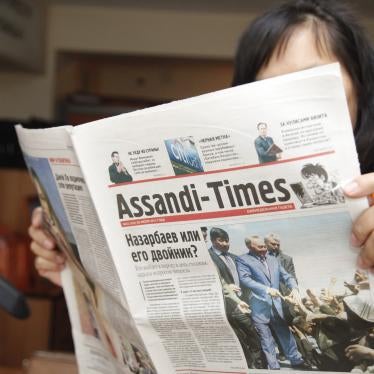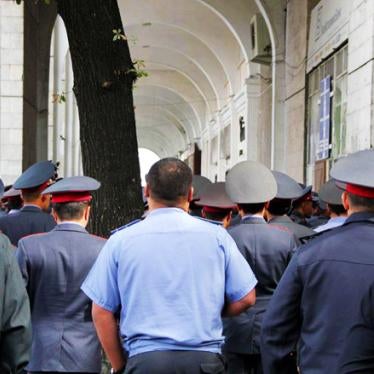(Berlin) – Central Asia’s already poor human rights record deteriorated further in 2014, Human Rights Watch said today in its World Report 2015. The governments of Kazakhstan, Kyrgyzstan, Tajikistan, Turkmenistan, and Uzbekistan failed to uphold and in some cases further undermined their core human rights commitments.
Central Asian countries adopted new criminal legislation restricting fundamental freedoms and put forward several draft laws that would seriously limit the activities of nongovernmental organizations. Authorities are holding people in prison on politically motivated charges and have imposed heavy restrictions on freedom of the media and assembly. Across the region impunity for torture remains the norm.
“While attention was focused on global crises last year, Central Asian governments committed serious abuses across a wide spectrum of human rights and faced virtually no consequences,” said Hugh Williamson, Europe and Central Asia director at Human Rights Watch. “Governments in the region should be held to account for failing to live up to their rights obligations, or the downward spiral is certain to continue.”
Some of these global crises have caused Central Asian governments concern as well, including the conflict in Ukraine, the withdrawal of most NATO troops from Afghanistan, and recruitment in Central Asia for the extremist group Islamic State (also known as ISIS). These concerns may persist in 2015. Central Asian governments have an obligation to respond in ways that uphold, not violate, fundamental human rights, and their international partners have a key role to play in holding them to this standard.
In the 656-page world report, its 25th edition, Human Rights Watch reviews human rights practices in more than 90 countries. In his introductory essay, Executive Director Kenneth Roth urges governments to recognize that human rights offer an effective moral guide in turbulent times, and that violating rights can spark or aggravate serious security challenges. The short-term gains of undermining core values of freedom and non-discrimination are rarely worth the long-term price.
Although Kyrgyzstan has taken some democratic steps in recent years and has in the past withdrawn draft legislation that would curb rights freedoms, the country’s rights record suffered significant setbacks in 2014. Members of parliament proposed legislation that would brand nongovernmental groups as “foreign agents” and initiated a blatantly discriminatory draft bill that would seriously restrict lesbian, gay, bisexual, and transgender rights. Activists were harassed and attacked and the rights defender Azimjon Askarov remains wrongfully imprisoned. Authorities have not held people accountable for violent courtroom attacks on defendants and their lawyers in one of the few ongoing cases related to the 2010 ethnic violence. Discrimination and violence against women and LGBT people are pervasive.
In Kazakhstan, authorities cracked down on free speech and peaceful dissent. They shut down several independent and opposition newspapers, introduced legislation that further tightens controls over fundamental freedoms of association, expression, religion, and assembly, and kept government critics, including Vladimir Kozlov, in prison. Kazakhstan has pledged a zero-tolerance policy toward torture and staff with its anti-torture prevention mechanism began monitoring visits. However, impunity for persistent allegations of torture and ill-treatment remains the norm.
Tajikistan’s human rights record deteriorated as authorities cracked down on freedom of expression, imprisoned opposition leaders, sued a leading independent news agency for “insult,” and arrested an academic researcher on trumped-up espionage charges. The government blocked various websites, considered introducing a new law that would require nongovernmental groups to register all funds from foreign sources, and harassed human rights groups. In a potentially encouraging development requiring further scrutiny, several organizations and Tajikistan’s human rights ombudsman created a monitoring group to investigate human rights conditions in prisons and detention centers.
There were no meaningful improvements in Turkmenistan’s exceptionally poor human rights record. The deeply authoritarian government restricts basic freedoms of association, expression, and religion, and the country is virtually closed to independent scrutiny. Independent nongovernmental organizations cannot operate freely, and activists, human rights defenders, and journalists – including those living in exile and their families in Turkmenistan – face a constant threat of government retaliation. Authorities use incarceration as a tool for political retaliation and refuse to reveal the conditions and whereabouts of dozens of people in its notoriously abusive prisons, some for more than a decade, which constitutes enforced disappearance under international law.
Uzbekistan’s authoritarian president, Islam Karimov, who has been in power for 25 years, employs a pervasive security apparatus to crack down on real and perceived opponents. Authorities repress all forms of free expression and do not allow any organized political opposition, independent media, or religious freedom. The country uses forced labor by both adults and children during the cotton harvest, and widespread torture in the criminal justice system occurs with near-total impunity. Authorities have imprisoned thousands of human rights and opposition activists, journalists, religious believers, artists, and others on politically motivated charges.
“Despite crises elsewhere, it is vital for Central Asia’s partners in the United States, the European Union, and elsewhere to focus on the urgent need to raise human rights standards in the region so that Central Asian governments get the message that their abuses need to stop,” Williamson said.








